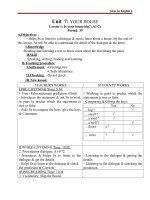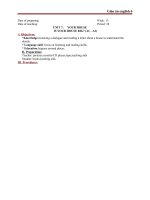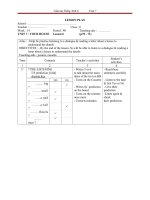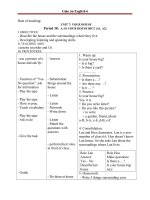Giáo án Tiếng Anh 12 unit 7: Economic reforms
Bạn đang xem bản rút gọn của tài liệu. Xem và tải ngay bản đầy đủ của tài liệu tại đây (183.29 KB, 27 trang )
Tiếng Anh 12 – Giáo án
UNIT 7: ECONOMIC REFORMS
A: READING
A. AIMS: To help students
- To help students gain some knowledge about economic reforms in Vietnam.
- To help students improve their reading skills: scanning and skimming,
guessing the meaning of words in context.
- Students learn words and phrases in terms of economics and policies.
B. AIDS:
- English textbook for students
- English textbook for teachers
- Pictures
A. Methods : Communicative approach and leaner- centered approach.
1.Class organization:
Class
Teaching date
Attendence
Absentee(s)
2.Checking up: Checking during the new lesson.
3.New lesson:
Teacher’s activities
Students’ activities
I. Warm-up:
Aims: To introduce the topic of the lesson and
to raise students' interest.
- Tell the class the the differences between
schools (hospitals, houses) now and the past
ten years.
-
- Now: beautiful buildings, good facilities,..
past: ….
Now: tractors, motorbikes, …
How do farmers transport their farming Past: Human’s force or animal’s force.
products now and how did they do ten years - the development of economic.
ago?
- What make all of these changes?
II. Before you read :
- Ask students (to work in pairs) to open their
books, look at the pictures, and do the tasks
that follow.
1. What can you see in the picture?
2. Do you think that the people in this picture
lead a rich or poor life?
3. What, in your opinion, should be done to
improve the situation?
- Ask them to work in 3 minutes, meanwhile
the teacher moves round to help if necessary.
- Ask some pairs to report .
- A village, farmers, a buffalo, some huts,…
- A poor village, of course the farmers lead a
poor life.
- Build a new road, change the cultivation
methods, …
- Give some remark if necessary
- Listen to the teacher then read the passages
III. While you read :
- Ask some new words if necessary
- Ask students to look through the passage and
read in silence
- Help students read the passage
- Read through the text find the new words,
- Explain pronunciation and meaning of new try to guess the meanings of those words in
words which appear in the passage
contexts:
Task 1 :
+ National Congresses: Đại hội toàn quốc
- Ask students to read through the text once to + Renovation (n): đổi mới
find out some new words, guess the main idea.
- Explain new words (give the Vietnamese
equivalents), guide the sts to get the main
contents of the reading text.
+ Under-developed (pp):áchậm phát triển
+ Inflation (n): lạm phát
+ Stagnant (adj): trì trệ
- Ask students to work individually in 3 + Government subsidies (n): sự bao cấp của
minutes to do this task.
chính phủ
- Guide students to read through the passage , + Government commitment (n): cam kết của
then focus on only the sentences surrounding
chính phủ
the suggested words to do the task effectively.
- Give students some more words that may be
new/ unfamiliar to them.
+ Dissolve (v): tan rã
+ Substantial (adj): lớn lao, đáng kể
- Guide the students to read the word in chorus - Get the meaning of some more words:
and individually.
+ Eliminate (v):….
+ Intervention (n):…..
+ Vietnamese Communist Party
Task 2:
+ Measure (n):……
- Ask students to read the passage again and + Promote (v):…..
choose whether the statements given are true
(T) or false (F).
- Ask them to work individually to do the task
and give the evidence to prove the keys.
+ Economic reforms (n):…..
+ Land Law
+ Enterprises Law
- Move round to make sure that all students are
working and to help them if necessary.
- Ask some students to report
feedback.
- Work individually to read the text then
and give choose whether the statements given are true
(T) or false (F).
Task 3:
- Share the key with other Ss.
- Ask students to read the passage again then 1. F
2. F
3. T
4. F
5. T
work in pairs to ask and answer the suggested - Find in the text the evidence to prove the
questions.
keys.
- Walk round the class to give help if
necessary.
- Do the task in pairs:
A: When and by whom was …?
B: in 1986 by the Vietnamese Communist
Party
A: What was the aim…?
B: to restructure the economy of Vietnam, to
Raise the living standard of the people.
A: Name the renovation measures…?
B: eliminated government subsidies. shifted
economic priority…..of export. reduced state
intervention
in
business.
open
trade
relation…..the world.
encourage foreign……investment.
- Give suggested words, phrases or useful A: How has Vietnam changed…?
suggestions.
B: productivity and agricultural export.
farmers have enjoyed. workers have worked
- Correct the students’ work.
harder. children, especially from, training.
A: What do we believe?
B: We believe that with the …..
VN before DM: economy under - developed
country and poor people – production
stagnant – shortage of schools, hospitals –
inflation.
IV. After you read :
Renovation measures:
- Ask students to work in group to scan the text eliminated government subsidies - shifted
again.
- Ask them to work in small groups of three or
four to talk about the text based on the
suggested points.
- Encourage them to use their own words.
- Ask one or two pairs to report.
economic priority…of export - reduced state
intervention in business relation…the
world
-
open trade
encourage
foreign……investment.
VN since DM: productivity and agricultural
export -farmers have enjoyed…workers have
worked harder. children, especially from …,
… training.
V. Home work:
- Write a passage to say what changes you’ve - Listen to the teacher
seen in your village since the year 1986. - Write down the homework to do at home.
compare to the past.
UNIT 7: ECONOMIC REFORMS
B: SPEAKING
A. AIMS:
- Students can ask and answer about some World Cup
- Students learn more words and phrases in term of music.
B. AIDS:
- English textbook for students
- English textbook for teachers
B. Methods : Communicative approach and leaner- centered approach.
1.Class organization:
Class
Teaching date
Attendence
Absentee(s)
2.Checking up: Checking during the new lesson.
3.New lesson:
Teacher’s activities
Students’ activities
I. Warm-up:
- Tell a short story to prove that the renovation - Listen and give one’s own ideas or story if
measures has apparently changed the social being asked.
and people’s lives positively.
II. Pre-speaking :
Task 1
- Explain the requirements clearly in English - Work in pairs to discus the three questions
“in your textbook, there are four pictures. and find the answers.
Now, what I would like you to do is to look at
them carefully and say what they are about”
- Ask students to work in pairs to discus the
three questions and find the answers.
- Correct the students’ work and give remark.
A: What does each pair of picture tell you?
B: It tells us the contrast between the present
and past situations.
A: What changes can you see in each pair
of…?
B: The new school and factory are much
bigger
and more beautiful than the old ones.
A: What do you think …to achieve these…?
B: They must have taken some renovation
measures.
III. While-speaking :
- Correct the answers oneself.
Task 2
- Explain the requirements “The country of
Fantasia started its overall reforms…”.
- Divide the class into groups, asks each group
to discuss a section: Education; Health care;
Group 1: Education
S1: The government of Fantasia has
changed the curriculum and textbooks.
Agriculture
S2: They also provided schools with more
- Guide the students how to speak by giving
them useful suggestions:
equipment and facilities.
S3: They build more schools and raised the
teachers’ salaries.
+ They have………… so ……
S1: It is obvious that they……
+ Due to the ………
Group 2: Health care
+ Thanks to the………
S1: Many hospitals have been built as well
+ By applying………
as the doctors’ and nurses’ salaries have
- Walk round from group to group to give help been raised.
if necessary.
S2: Due to the government’s policy, many
- Encourage students to speak out what they more highly qualified doctors have worked
think even a phrase or a singular word.
to improve the people’s health.
− Disadvantaged(adj): in a bad social or Group 3: Agriculture
economic situation; poor
S1: Fantasia has applied appropriate policy
− Method(n): a way of doing sth
− Qualified(adj) having passed an exam or
having the knowledge, experience, etc. in
order to be able to do sth
to
encourage
farmers
to
work
more
efficiently, and they have built more dykes
and damps, irrigation and drainage systems.
a S2: They’ve also applied new and advanced
company in which you pay them regular farming techniques, more facilities and
amounts of money and they agree to pay the equipment.
− Insurance(n):
an
arrangement
with
costs if, for example, you die or are ill, or if S3: They use fertilizers, pesticides and
you lose or damage sth
insecticides to protect their crops.
− Irrigation(n): bringing a supply of water to a
dry area, especially in order to help crops to
grow
− Drainage(n): a system used for making
water, etc. flow away from a place
− Fertilizer(n):
a
natural
or
S1: The government of Fantasia has
changed the curriculum and textbooks. They
also provided schools with more equipment
chemical
substance that is put on land or soil to make
and facilities. They build more schools and
raised the teachers’ salaries…
plants grow better
− Pesticide(n): a chemical substance that is
used for killing animals, especially insects,
to
encourage
farmers
to
work
more
efficiently, and they have built more dykes
that eat food crops
-
S2: Fantasia has applied appropriate policy
Insecticide(n): a substance that is used for
and damps, irrigation and drainage systems.
They’ve also applied new and advanced
killing insects
farming techniques, more facilities and
IV. Post-speaking :
equipment. They use fertilizers, pesticides
Task 3
and insecticides to protect their crops.
- Ask students to work individually to
summarize what they’ve discussed in their own S1: What have the government and the
words.
people of Fantasia done to improve
- Move round to check the activities and to education?
make
sure
that
students
effectively.
are
working S2: They have built more schools and have
equipped more equipment and facilities.
- Ask one or two students to report in front of S3: They also give more scholarships to
the whole class.
poor of disadvantage students.
- Check and give remarks.
V. Homework:
- Listen to the teacher.
- Ask Ss to give name some measures we’ve
made to promote our economic system.
- Write down the homework to do at home.
Unit 7: ECONOMIC REFORMS
C: LISTENING
A. Aims
- Students can improve their listening skill: they can catch detail information
from the passage.
- Students can summarize the passage.
B. Aids
- English textbook for students
- English textbook for teachers
- Tapes and cassette
- Handouts
C. Methods : Communicative approach and leaner- centered approach.
1.Class organization:
Class
Teaching date
Attendence
2.Checking up: Checking during the new lesson.
3.New lesson:
Absentee(s)
Teacher’s activities
Students’ activities
I. Warm-up:
- Let students play crosswords to revise the
vocabulary in Reading lesson.
- Call some pairs to give the answers.
- Ask students to do task 1: discuss the
question: Do you think that drug- taking
should be banned? Why and Why not?
- Ask one pair to report what they have
discussed.
- Listen to the teacher.
- Play the game.
- Do task 1 in pairs
S1: Do you think that drug-taking should be
banned?
S2: Yes, I think so.
S1: Why so?
S2: Because taking drug is harmful to
II. Before you listen:
- Ask students to work in pairs to ask and
people’s health.
- Work in pairs:
answer the given questions.
S1: Should drug-taking be banned?
- Guide the students to answer if necessary.
S2: Yes, because it brings the users many
- Give further information.
harm on not only their physical but also
mental health.
S1: Drug-taking is totally a social evil.
- Listen and repeat:
- Explain the words that will appear in the
listening text.
- Ask students to read in chorus then
Tango
Discourage
Drug-taker
Rationally
individually.
Ruin
Solution
Unfortunately
Measures
Islanders
- Read the statement once to get the main
contents.
Listen to the tape and do the task.
Find evidences to each of the answers.
III. While you listen:
Task 1:
- Ask students to read the statement at least
once first.
- Ask them to guess the answers
Represent if being asked.
- Answers:
1.
F(in the Atlantic Ocean)
2.
F(a plant which contained a powerful
drug)
3.
T
- Play the tape once then check how many 4.
5.
answers can students find.
T
- Play the tape again.
- Check and give remarks.
- Call some students to say out their answers
F(on TV)
6.
F(nobody took any notice)
7.
T
8.
T
9.
F(other countries)
and the evidences they get to prove their - Listen to the teacher’s explanation then
answers.
correct the answers onself.
- Read the questions once to get the main
contents.
- Listen to the tape and do the task.
Task 2:
- Find evidences to each of the answers.
- Ask them to guess the answers.
Represent if being asked.
- Play the tape once then check how many 1. They discovered a plant which contained
answers can students find.
a powerful drug.
- Play the tape again.
2. They grew it all over the island.
- Check and give remarks.
3. The negative effects the drug brought
-
Call some students to say out their answers
about were:
and the evidences they get to prove their - Workers and farmers became lazy,
answers
- Children did not want to go to school, and
- The whole population began to run short of
food.
4. The government took three measure:
introduced a law to make the drug illegal,
put the drug- takers into prison, and
exported the drug to other countries.
IV. After you listen:
5. Eventually they decided to export the drug
- In group, ask students to discus the guided to other countries.
question, find the answer.
- Listen to the teacher’s explanation then
- Move around to help if necessary.
correct the answers oneself.
- Give remarks or even suggestions.
- In groups, ask and answer the question.
S1: Do you think that the Government of
Tango……?
S2: I don’t agree with that solution because
when they export the drug to other countries
the other peoples will suffer from the drugtaking problems, and other government will
face the same problems as theirs.
- Listen to the teacher’s guide to correct
oneself.
- Listen to the teacher and write down
V. Homework:
- Imagine you are an MP of Tango what would
you do to solve the problem.
homework to do at home.
Handout
1
2
1 D O M I
2 I N F L A T I
3
N A T E
O N
I
S
3 S T A G N A N T
4 C O N S U M E R
5 R E N O V A T I
A
O N T
L
E
6 R E S O L V E
7 E D U C T I
O N
Fill in the box with the words which means…
Down:
1. to become or to make sth become liquid
2. a soft silver-white metal that is often mixed with other metals
3. a large area of land in the countryside that is owned by one person or family
Across:
1. to be more powerful, important or noticeable than others
2. a general rise in prices; the rate at which prices rise
3. not flowing and therefore dirty and having an unpleasant smell
4. a person who buys things or uses services
5. bring something such as a building back to a former better state by means of
repairs, redecoration , or remodeling
6. to find an answer to a problem
7. the teaching or training of people, especially in schools
Answers:
1
2
1 D O M I
2 I N F L A T I
3
N A T E
O N
I
S
3 S T A G N A N T
4 C O N S U M E R
5 R E N O V A T I
A
O N T
L
E
6 R E S O L V E
7 E D U C T I
O N
Unit 7: ECONOMIC REFORMS
D: WRITING
A. AIMS:
- Students can write a report basing on the information given in the Table of
Tango’ economic development in two decades
- Students can improve their writing skill.
B. AIDS:
- English textbook for students
- English textbook for teachers
C. Methods : Communicative approach and leaner- centered approach.
1.Class organization:
Class
Teaching date
Attendence
Absentee(s)
2.Checking up: Checking during the new lesson.
3.New lesson:
Teacher’s activities
Students’ activities
I. Warm-up:
- Free talk about the changes in one’s home - Do as required.
village during the renovation process.
- Exchange the ideas with others.
II. Pre-writing:
- Explain as clearly as possible the requirements - Listen to the teacher.
“The table below presents the results the
Government…”.
- Get the task.
- Look at the table page 76
- Ask students to look at the table page 76
This table presents the achievements the
government and the people of Tango have - Listen to the teacher.
gained in some braches of the economy after - Guess the meaning of the new words.
two decades of their economic reform.
- Introduce some new words.( eliciting , give
the definitions in English then ask students to
translate them into Vietnamese to check their - Fishery : ngư nghiệp
understanding)
− Fishery: the catching, processing, or
selling of fish, including the industries
and
occupations
involved
in
- Forestry: lâm nghiệp
these
activities
− Forestry: the science or skill of planting
and growing trees or managing forests
- Read the words
- Let the whole class read the new words twice
or three times.
- Call 2-3 students to read new words again
III. While-writing:
- Work in pairs to do the task.
Task 1
- Ask students to look at Task 1.
- In pairs, ask students to ask and answer the
questions.
- Move around to give help.
- Check and give remarks.
S1: What was the economic situation in
Tango before 1980?
S2: It was really bad. The country was
under-developed.
S1: What can you say about the economic
situation in Tango from 1980 to 200?
S2: Many positive changes has made. The
economic situation in 2000 is much better
than the one in 1980.
S1: What do you think the ….?
S: They have taken positive measures….
Task 2
- Listen to the teacher to correct oneself.
- Explain the requirements: Writing a report.
- Work in groups to do the task.
- Ask students to do Task 2 individually: write
The Government and the people of Tango
a report of 150 words on the economic
started their overall economic reform in the
development of Tango. It must conclude details
mid 1970s. Before that time the economy of
such as:
the country was in ruins………. . The
− The economic situation of Tango before
1980
Government of Tango has taken a lot of
measures in order to promote the national
economy
such
as…….
.
Despite
all
− The measures taken by the government difficulties, the people of Tango ….. . After
and the people of Tango to overcome the all, they have received greater and greater
problems.
− The achievements (as presented in the
achievements….
table) they have made as a result of the - Compare the result to the other groups.
reform.
What words do you often use to express
- Listen to the teacher’s explanations.
- Exchange the writing to other groups to
changes in economy?
check and give remarks.
+ The economic situation of
Tango before
1980.
- Represent the task on board if being asked.
- Read the writing to get others’ remarks.
+ The measures taken by the Government and The Government and the people of Tango
started their overall economic reform in the
the people of Tango overcome the problems.
+ The achievement ( as presented in the table)
they have made as a result of the reform.
mid 1970s. Before that time the economy of
the
country
was
in
ruins……
The
Government of Tango has taken a lot of
- Ask students to work in groups to write report. measures in order to promote the national
- Walk round to give help if necessary.
economy such as……Despite all difficulties,
the people of Tango …After all, they have
received greater and greater achievements…
IV. Post-writing:
- Ask some groups to represent their work, ask - Do as the teacher asked.
other to give remark.
- Choose some good writing to read in class and
give remark.
V. Homework:
- Listen to the teacher and write down
homework.
- Ask students to rewrite the task at home and
preapare part Language Focus at home.
Unit 7: ECONOMIC REFORMS
E: LANGUAGE FOCUS
A. AIMS:
1. Pronunciation:
- Students can pronounce correctly the sounds /s/ and /z/ and words
pronounced with /s/ and /z/.
2. Grammar:
- Students know how to use “to infinitive” to talk about purposes.
- Students revise information questions.
- Students practice using past tense to talk about people’ autobiography.
B. AIDS:
- English textbook for students
- English textbook for teachers
- Pictures
C. Methods : Communicative approach and leaner- centered approach.
Teacher’s activities
Students’ activities
I. warm up:
- Introduce the lesson to the students.
Auxiliary often has the strong form when it is
used in short answers, and it has the weak form
when it is used in questions.
- Read the auxiliaries both strong and weak
forms for students to recognize the difference
- Listen to the teacher.
- Read the second time for the students to
- Read the sound
repeat.
- Ask 2-3 students to repeat, correct their
mispronounce.
- Get the teacher’s explanation.
II. Pronunciation:
- Explain the way to use strong form (emphasis,
positive,
stressed
cases
),
weak
(interrogative, unstressed cases)
- Help students to know the pronunciation.
- Practice:
A: Can you speak English?
B: Yes, I can.
A: Must we go now?
B: I think we must.
A: Have you met Quang?
B: Yes, I have
A: Has she gone?
B: Yes, she has.
A: Shall we go now?
B: I think we ought to.
Can /kæn/ (str)
/kən/ (w)
form Could /kud/
Must /mΛst/ (str)
/məst/ (w)
Have /hæv/
Has /hæs/
Do /du/
Does /dΛz/
Is /iz/
Am / æ m/
Will /wil/
Shall /∫æl/
- Practice reading in chorus or individually.









